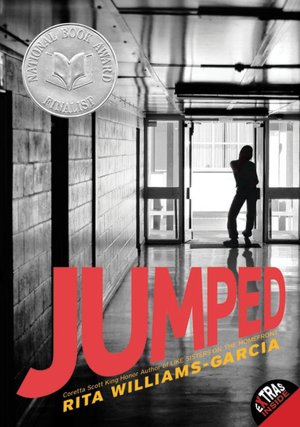Williams-Garcia, Rita. Jumped. New York: HarperTeen/Amistad, 2009. 168p.
Audience: Middle and High School, 13+, Reluctant Readers
Genre: Urban Fiction,
Topics of Focus: Adolescence, Anger Management, Bullying, Decision Making, Personal Responsibility, Support Systems, Adolescent Violence, Urban High School
Renowned author Rita Williams-Garcia once again presents a text with its fingers on the pulse of the American urban teenager.
Jumped, a 2010 National Book Award Finalist, leads the reader through the hallways, classrooms, and minds of adolescents whose understanding of community ethics and personal responsibility are terribly skewed. By using a chapter-by- chapter shifting narration of three central characters, Trina, Dominique, and Leticia, Garcia gives the reader strong insight into three different lives, three personalities, and three perceptions of several seemingly-harmless actions leading to one tragic result. Trina is a self-centered, confident, smart, creative, crowd-pleasing, bi-racial teen. She’s cute and lets everyone know it. She is prime fodder for the scorn of other not-so-confident adolescents who struggle to make a place for themselves in the teen jungle. Dominique is an angry, hard, basketball-junkie with questionable sexual-orientation, no desire to succeed academically, and no family support. In fact, there is no mention of her family at all in the book. The only adult direction she receives is from her coach (who benches her for her low grades) and a special behavior-redirection program for students labeled as significantly “at risk” and troublesome. Dominique is a powerful train barreling down the tracks of adolescence with no brakes and no understanding of her own ability to control her actions and decisions. She acts out of pain, frustration, and vicious anger, like a caged, wounded animal. The third narrator who holds the greatest decision-making power is Leticia, a spoiled, over-weight, cell phone-addicted, gossipy drama queen who likes to stir the pot just because she’s bored. If something doesn’t affect her directly, she takes no responsibility. But, if she so much as breaks a nail in gym, she will demand that the entire world stop what it’s doing and fix her life. She observes an innocent altercation between Trina and Dominique. She understands how volatile the situation can be. She can stop it simply by saying something to the right adults, but she chooses not to. Even after the altercation turns violent and tragic between the other two girls right in front of her, Leticia remains unaffected and doomed to embracing the superficial Jerry Springer world of human interaction.
Jumped, a 2010 National Book Award Finalist, leads the reader through the hallways, classrooms, and minds of adolescents whose understanding of community ethics and personal responsibility are terribly skewed. By using a chapter-by- chapter shifting narration of three central characters, Trina, Dominique, and Leticia, Garcia gives the reader strong insight into three different lives, three personalities, and three perceptions of several seemingly-harmless actions leading to one tragic result. Trina is a self-centered, confident, smart, creative, crowd-pleasing, bi-racial teen. She’s cute and lets everyone know it. She is prime fodder for the scorn of other not-so-confident adolescents who struggle to make a place for themselves in the teen jungle. Dominique is an angry, hard, basketball-junkie with questionable sexual-orientation, no desire to succeed academically, and no family support. In fact, there is no mention of her family at all in the book. The only adult direction she receives is from her coach (who benches her for her low grades) and a special behavior-redirection program for students labeled as significantly “at risk” and troublesome. Dominique is a powerful train barreling down the tracks of adolescence with no brakes and no understanding of her own ability to control her actions and decisions. She acts out of pain, frustration, and vicious anger, like a caged, wounded animal. The third narrator who holds the greatest decision-making power is Leticia, a spoiled, over-weight, cell phone-addicted, gossipy drama queen who likes to stir the pot just because she’s bored. If something doesn’t affect her directly, she takes no responsibility. But, if she so much as breaks a nail in gym, she will demand that the entire world stop what it’s doing and fix her life. She observes an innocent altercation between Trina and Dominique. She understands how volatile the situation can be. She can stop it simply by saying something to the right adults, but she chooses not to. Even after the altercation turns violent and tragic between the other two girls right in front of her, Leticia remains unaffected and doomed to embracing the superficial Jerry Springer world of human interaction.
Williams-Garcia deftly moves from teen to teen, offering the reader authenticity in dialogue, thought-process, and the events unfolding in the high school halls. An adult reader could take offense by the portrayals of the ineffective adults in the girls’ lives, but they would have to admit also to their realism. Educators and mentors of teens will find this text useful for processing decision-making and community building with their own adolescents. Reluctant readers will be carried along by the personalities and the drama of the story. The text does hold some profanity, sexually explicit material, and graphic violence. Yet, Jumped is a must-read for any educational setting with a racially-diverse population or clientele with poor anger management skills.
Annotation by Denise Aulik

No comments:
Post a Comment